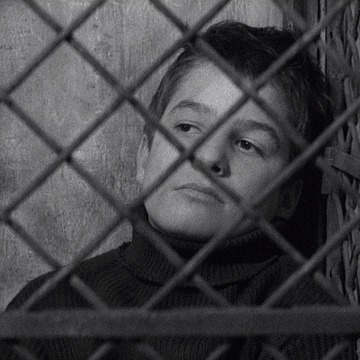All day tomorrow, Saturday, August 13, TCM is featuring the films of James Stewart—and it’s a terrific lineup, with some of Stewart’s most well-known films, and some of classic Hollywood’s best. Some of the highlights:
6am (PST): Mr. Smith Goes to Washington (1939) – the Frank Capra classic about DC politics
11:30am: The Shop Around The Corner (1940) – a romantic comedy gem directed by Ernst Lubitsch, the film on which You’ve Got Mail was based
1:15pm: Bell, Book and Candle (1959) – Kim Novak, Jack Lemmon and Elsa Lanchester as Greenwich Village witches
5pm: The Man Who Shot Liberty Valance (1962) – with John Wayne, directed by John Ford – “When the legend becomes fact, print the legend.”
9pm: Anatomy Of A Murder (1959) – courtroom drama directed by Otto Preminger
Bell, Book and Candle is not going to be on too many lists of greatest or must see movies, but it is a fun little film I’ve loved since I saw it on TV as a young kid. There are a lot of movies like it for me—movies that showed on Channel 2 or 20 or 44 in big blocks on Saturdays and Sundays and that formed my love of classic Hollywood, of Abbott & Costello, Bing and Bob, Fred and Ginger and the rest.
Maybe Ernst Lubitsch’s The Shop Around the Corner played on TV back then, but if it did I missed it. Of course, that just meant I got to see it for the first time on a reel screen in a decent print, and the film is indeed a gem. Not as sparkling as Lubitsch’s masterpieces, Trouble in Paradise (1932) and Ninotchka (1939), but still a treasure. Stewart had been starring in films for 5 years and this was his 21st, but he looks so fresh—perfect as the young shop clerk Alfred Kralik who lands a position at the Budapest shop of Matuschek and Company and falls in love with a woman he knows only through the letters they exchange.
Although Samson Raphaelson is credited as screenwriter, it seems likely that some of the credit should go to Lubitsch, who could have drawn on his experience growing up in pre-War Europe and with his father’s business as a draper for so much of the details of the film. I like that the film is set in Budapest, and that the to American ears odd-sounding Hungarian names are used for all the characters. It was filmed in Hollywood and most of the cast and crew were American, but it has a real European film—helped by the marvelous, marvelous performances of the Prussian-born Felix Bressart as Pirovitch, Kralik’s closest friend in the shop, and the Viennese Joseph Schildkraut as the slimy Vadas. Bressart also appeared in Lubitsch’s Ninotchka, as one of the Russians who Greta Garbo is sent to oversee.
Jimmy Stewart is one of the great stars of the classic Hollywood cinema—an all-rounder who did everything well. He made some of the best comedies (The Philadelphia Story, You Can’t Take It with You), terrific dramas and biopics (Anatomy of a Murder, The Glenn Miller Story), two of Hitchcock’s best (Vertigo and Rear Window), great Westerns (perhaps most of all Winchester ’73)—and of course that beloved holiday classic, It’s a Wonderful Life. Jimmy Stewart once said that he wanted people to remember him “as someone who was good at his job.” We remember him as one of the greatest.
And if you don’t believe me, you can get visual proof on this Tumblr blog: fuck yeah, jimmy stewart.
For more…
- James Stewart filmography – Wikipedia, the free encyclopedia.
- The Shop Around the Corner – Wikipedia, the free encyclopedia.
- Ernst Lubitsch – Wikipedia, the free encyclopedia.
- Felix Bressart – Wikipedia, the free encyclopedia.
Filed under: Movies, Classic Films, TCM





